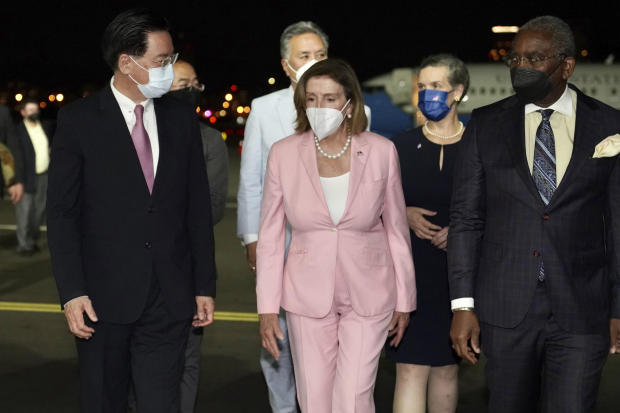US Speaker visits Taiwan despite pressure from China
House Speaker Nancy Pelosi landed in Taiwan’s capital of Taipei on Tuesday, arriving for a controversial stop on her tour of Asian countries that has become a flashpoint amid rising tensions between the U.S. and China.

In this photo released by the Taiwan Ministry of Foreign Affairs, U.S. House Speaker Nancy Pelosi, center, arrives in Taipei, Taiwan, Tuesday, Aug. 2, 2022. Pelosi arrived in Taiwan on Tuesday night despite threats from Beijing of serious consequences, becoming the highest-ranking American official to visit the self-ruled island claimed by China in 25 years. ( Taiwan Ministry of Foreign Affairs via AP)
House Speaker Nancy Pelosi landed in Taiwan’s capital of Taipei on Tuesday, arriving for a controversial stop on her tour of Asian countries that has become a flashpoint amid rising tensions between the U.S. and China.
Pelosi and other members of Congress emerged from a U.S. military jet that touched down Tuesday evening in Taipei, where they were greeted by a contingent of Taiwanese officials on the tarmac.
The plane traveled from Kuala Lumpur on a flight path that avoided the South China Sea and the Chinese mainland, according to the tracking website FlightAware.
Pelosi’s trip to Taiwan has been cloaked in secrecy and stoked the ire of Beijing, which raised the prospect of a military response to the visit. The White House has said it had no control over Pelosi’s decision to visit the island, and has insisted that there has been no change to U.S. policy toward Taiwan and the Chinese government.
As the second in line for the presidency, Pelosi is the highest-ranking U.S. official to visit the island in 25 years. The California Democrat’s history of pushback against Beijing dates back to 1991, when she displayed a pro-democracy banner in Tiananmen Square, defying Chinese officials.
In a statement shortly after the plane landed, Pelosi said her visit was meant to honor “America’s unwavering commitment to supporting Taiwan’s vibrant Democracy.”
“Our discussions with Taiwan leadership will focus on reaffirming our support for our partner and on promoting our shared interests, including advancing a free and open Indo-Pacific region,” she said. “America’s solidarity with the 23 million people of Taiwan is more important today than ever, as the world faces a choice between autocracy and democracy.”
The speaker emphasized that the visit “in no way contradicts longstanding United States policy” toward Taiwan and China, and said the U.S. “continues to oppose unilateral efforts to change the status quo.”
In an op-ed for The Washington Post explaining her rationale for the visit, Pelosi criticized Beijing’s actions in Hong Kong, Tibet, Xinjiang and across the mainland, saying China’s “abysmal human rights record and disregard for the rule of law continue, as President Xi Jinping tightens his grip on power.”
A Taiwanese government official said Pelosi was expected to meet with President Tsai Ing-wen and members of the legislature in Taipei. The U.S. delegation is expected to stay Tuesday night in the capital and hold meetings throughout the day Wednesday before departing.
The skyscraper Taipei 101, the island’s iconic tallest building, flashed messages welcoming Pelosi to the capital ahead of her arrival Tuesday evening.
Beijing considers self-ruled Taiwan to be part of China, and Chinese officials have been warning they would regard Pelosi’s visit as a major provocation.
China’s Ministry of Defense said the People’s Liberation Army would soon begin military exercises around the island of Taiwan, including “long-range live ammunition firing in the Taiwan Strait, and organizing regular-guided fire testing in the eastern waters of Taiwan Island.” A statement from the ministry said the exercise was meant to serve as “a solemn deterrent against the recent major escalation of the negative actions of the United States on the Taiwan issue, and a serious warning to the ‘Taiwan independence’ forces seeking ‘independence.'”
During a two-hour phone call with President Biden last week, Chinese President Xi Jinping demanded Pelosi cancel the trip. Earlier in July, Mr. Biden said U.S. military officials thought it was “not a good idea” for Pelosi to visit Taiwan right now.
A U.S. Navy official said Tuesday that three U.S. warships were in the waters east of Taiwan conducting routine operations, including the aircraft carrier USS Ronald Reagan, a destroyer and an amphibious assault ship.
According to Reuters, Chinese foreign ministry spokesman Zhao Lijian said Monday its military would “not sit idly by” if Pelosi visited. During a daily briefing, Lijan said a visit by the “No. 3 official of the U.S. government” would “lead to egregious political impact.”
On Monday, National Security Council spokesman John Kirby confirmed Pelosi was traveling on a U.S. military aircraft, and he said she had been briefed on Taiwan.
Culled from CBS
